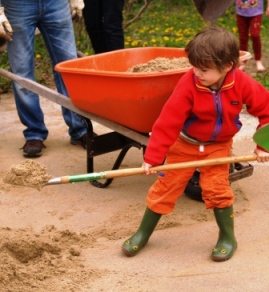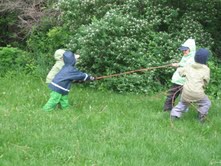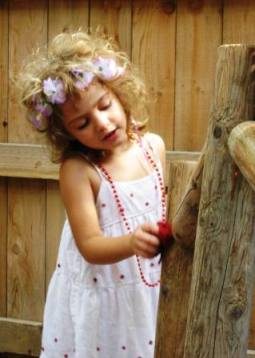Jaimmie writes: Recently, a plumber came to LifeWays to repair the garbage disposal. At the time, we were getting dressed to go outdoors. As soon as they caught sight of the plumber with his toolbox, a group of little boys in hastily-assembled outdoor gear were in the kitchen doorway watching the “worker guy.” One by one, I coaxed the intent observers back to their hooks to finish dressing. We fixed backwards snow pants and adjusted an upside-down jacket, put on a missing boot and a discarded mitten. Throughout the entire process, the little fellas kept inching toward the kitchen and stealing glances at the plumber (all the girls were in preschool on this particular day).
When we finally made it outside and into the woods, the children immediately gathered up their “tools” to do their own work. Elijah filled a favorite hollow stump with leaves and brambles and then the children proceeded to unclog the stump with their sticks. The play evolved and the sticks turned into saws and hammers and shovels. The little plumbers became builders, mechanics, construction workers and gardeners. The entire morning was spent imitating purposeful work and playing peacefully.
While the children played, I sat nearby crocheting a washcloth. Little Otto came over and asked “Doing?” When I told him that I was making a cloth, his eyes lit up and he watched as the ball of yarn slowly became a cloth. Face-washing is a favorite activity in our suite. Each day when we come in from the woods, I fill a bowl with warm water and put in a drop of lavender oil and a special cloth for each child. The children wash their faces while we sing “Two little eyes to look around. Two little ears to hear each sound. One little nose to smell what’s sweet. One little mouth that loves to eat.” When they are done washing, they come to me with a smile on their shining faces and ask if they are all clean. I help them finish if they’ve missed a spot and then they hang their cloth on the line to dry. As I finished crocheting the washcloth, I could hear the wonder in Otto’s voice when he said, “Cloth?”
came over and asked “Doing?” When I told him that I was making a cloth, his eyes lit up and he watched as the ball of yarn slowly became a cloth. Face-washing is a favorite activity in our suite. Each day when we come in from the woods, I fill a bowl with warm water and put in a drop of lavender oil and a special cloth for each child. The children wash their faces while we sing “Two little eyes to look around. Two little ears to hear each sound. One little nose to smell what’s sweet. One little mouth that loves to eat.” When they are done washing, they come to me with a smile on their shining faces and ask if they are all clean. I help them finish if they’ve missed a spot and then they hang their cloth on the line to dry. As I finished crocheting the washcloth, I could hear the wonder in Otto’s voice when he said, “Cloth?”
 American children are surrounded with all sorts of things, yet there is a cultural disconnect between our possessions and their source. This kind of materialism is quite understandable in a world where most goods are shipped from across the sea, purchased at a big-box store, and tossed into the trash as soon as they break or become a nuisance (and then shipped back over the sea as exported trash). When adults tend to our things (sewing, knitting, building, fixing, etc.), we cultivate the child’s natural interest in how things are made and how things work. To observe and assist an adult in making or repairing an item brings a sense of true value to the item. Moreover, it brings a sense of what it is to be human. People make washcloths. People make garbage disposals and pipes. People build houses and roads. People make gardens and farms. People make a wide world of things. And when something is broken, people can fix it.
American children are surrounded with all sorts of things, yet there is a cultural disconnect between our possessions and their source. This kind of materialism is quite understandable in a world where most goods are shipped from across the sea, purchased at a big-box store, and tossed into the trash as soon as they break or become a nuisance (and then shipped back over the sea as exported trash). When adults tend to our things (sewing, knitting, building, fixing, etc.), we cultivate the child’s natural interest in how things are made and how things work. To observe and assist an adult in making or repairing an item brings a sense of true value to the item. Moreover, it brings a sense of what it is to be human. People make washcloths. People make garbage disposals and pipes. People build houses and roads. People make gardens and farms. People make a wide world of things. And when something is broken, people can fix it.
Jaimmie Stugard has been a caregiver at the Milwaukee LifeWays for over ten years. She is grateful that she is able to bring her own little ones with her to LifeWays each day. She is also the music teacher in the Wisconsin LifeWays Training.
We thank you for stopping by to enjoy this article. If you would like to share your experiences working with children in a LifeWays home or center, please feel free to contact Mara Spiropoulos at linearmara@gmail.com. She would be thrilled to work with you to share your wisdom and experiences on the LifeWays blog.

Materialism
Dear Jaimmie, Once again you hit the nail on the head, pun intended. I recently read this quote by Henry David Thoreau about educating children in schools: “I mean that they should not play life, or study it merely, while the community supports them at this expensive game, but earnestly live it from beginning to end. How could youths better learn to live than by at once trying the experiment of living? … Which would have advanced the most at the end of a month, – the boy who had made his own jackknife from the ore which he had dug and smelted, reading as much as would be necessary for this, – or the boy who had attended the lectures on metallurgy at the Institute in the meanwhile, and had received a Rogers’ penknife from his father?” Of course, we are working with little children so they are unlikely to smelt their own knives; however, by exposing them to real work (plumbers repairing things) and real creating of things (crocheting cloths), they are then able to “play life” in a meaningful way. Don’t we want to introduce them to the “stuff” of life in such a way that they recognize the sacred nature of maintaining and creating? Thanks for this lovely story of earnestly-lived life with children. In gratitude, Cynthia